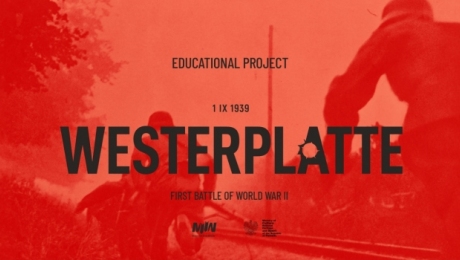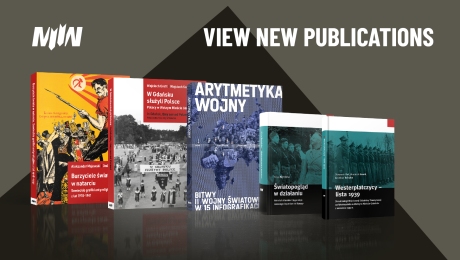The 2nd edition of the totalitarian propaganda film festival
On 20-22 May 2015 Museum of the Second World War organised the 2nd edition of the totalitarian propaganda film festival at the Gdańsk Shakespeare Theatre at Bogusławskiego Street 1.
“The second edition of the totalitarian propaganda film festival promises to be as attractive as the first one last year. Once again the selection of films includes titles representative of the film propaganda of the Stalinist Soviet Union, Fascist Italy, Nazi Germany and Poland during the Bierut administration. Polish viewers will have a chance to see some of the films for the first time,” stated Professor Eugeniusz Cezary Król, the scholastic supervisor of the festival.“One should take a moment to analyse the totalitarian film propaganda models, and not only for purely cognitive purposes. In the world today one observes a return to the methods and techniques of visual propaganda. Reflection on this coincidence will perhaps facilitate relating not only to the specificity of the cinematography of the totalitarian states of old, but also to the current problems connected with the functioning of the mass media in Poland and other countries.”
Viewers could see such films as Prostitute, The New Land, Old Guard,Jew Süss and Soldier of Victory.
Prostitute is a silent film of 1926. At the beginning of the Soviet Union difficult social issues were raised and treated as the bleak legacy of capitalism. It soon was seen that many social ailments were equally acute in the Soviet reality, with prostitution being one of such shameful maladies. The film shows a propaganda vision of solving that problem. DespiteProstitute’s obtrusive didacticism its director managed to sneak in a handful of bona fide observations about the problems of the Soviet people during the New Economic Policy. The stark poetics of the film, which today has a documental value, proved helpful.
Based on the first volume of Mikhail Aleksandrovich’s book And Quiet Flows the Don, The New Land is a typical example of socialist realism in film, as it presents the collectivisation of a Cossack village in line with the Stalinist propaganda model. Consequently, we have the only right doctrine and the inspiring role of party activists, open-minded peasants, who understand the point of the socialist reconstruction, and their enemies from a stratum of rich kulaks, who get what they deserved. The ploughing of fallow land becomes a symbolic closure of the collectivisation process. Combined with the beautiful cinematography and good acting, the notable presentation of the way of life of the Cossack society to some extent alleviates the script’s lack of originality.
Directed by Alessandro Blasetti, Old Guard is a 1934 drama and a model example of Italian films glorifying fascism. It is set in 1922, shortly before the fascist March on Rome. In the narration Italy is depicted as standing on the verge of a catastrophe, threatened not only by Marxist troublemakers, but also by the incompetent administration of liberals and democrats. The revival comes to pass due to the ‘healthy forces’ of the nation. The character of Little Mario, whose life and death are proof of his readiness to make the greatest sacrifice, becomes an embodiment of these values. The filmmakers intended the film as support of Mussolini’s regime through legitimisation of the methods by which he came to power. However, it failed to win fascist dignitaries’ acclaim, being criticised on the grounds that the violence it showed discredited the image of the party as the defender of the working class. Even though Old Guard follows the propaganda model, it includes interesting sociological observations, to which the director owes his reputation as a precursor of Italian neorealism.
Jew Süss is Veit Harlan’s 1940 film made on commission from the Third Reich authorities. Anti-Semitic and racist, it presents a distorted biography of Joseph Süss Oppenheimer (1692–1738), a Jewish merchant and banker of Prince Charles Alexander of Württemberg. The German Minister of Propaganda, Joseph Goebbels, personally made a number of changes in the script and supervised the film’s production. After the war, in 1949, the director was accused of ‘crimes against humanity’. The prosecuting attorney tried to prove that by making the anti-Semitic film Harlan contributed to the mass extermination, as Jew Süss was to psychologically prepare Germans for criminal acts and was a direct call to the greatest extermination of modern times. The jury, however, deemed him innocent of the acts he was accused of. In an act of expiation the filmmaker wanted to destroy the existing copies of the film, in which he only partly succeeded though.
Soldier of Victory is a biopic about Karol Świerczewski, a Red Army General-Colonel and Polish People’s Army General, who was born into a Polish family in Warsaw in 1897. In 1915, as a young labourer, he was evacuated by the tsarist authorities into the interior of Russia. In late 1917 Świerczewski volunteered to the Bolshevik army.
In 1920 he became commander of a Red Army infantry battalion and fought against Poland on the western frontline. Codenamed ‘Generał Walter’ (General Walter), during the 1936–1938 Spanish Civil War he commanded international units fighting against General Franco’s rebellion. He made friends with Ernest Hemingway, who portrayed him as General Golz in his novel For Whom the Bell Tolls. In 1943 Stalin assigned him to play the role of the ‘Polish General’ — the deputy commander of the Polish Army in the USSR. But being an incompetent commander, Świerczewski never won any major victories on a battlefield due to his worsening alcoholism and disregard for the life and health of his soldiers. He died in the Bieszczady Mountains in partly unexplained circumstances in March 1947, when he and his escort fell into a trap set by the Ukrainian Insurgent Army detachments. After death Świerczewski became an icon of communist propaganda and was made a hero of many myths, which had little to do with historic facts.















